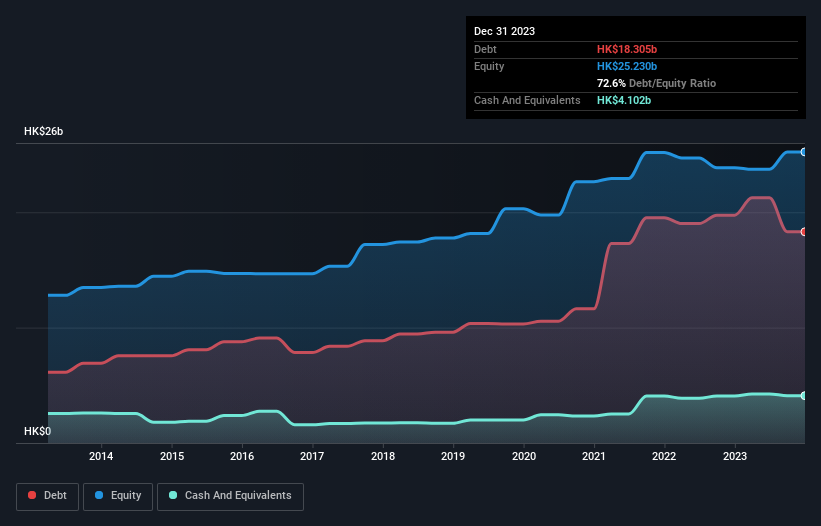- Hong Kong
- /
- Gas Utilities
- /
- SEHK:1083
These 4 Measures Indicate That Towngas Smart Energy (HKG:1083) Is Using Debt In A Risky Way
Legendary fund manager Li Lu (who Charlie Munger backed) once said, 'The biggest investment risk is not the volatility of prices, but whether you will suffer a permanent loss of capital.' It's only natural to consider a company's balance sheet when you examine how risky it is, since debt is often involved when a business collapses. Importantly, Towngas Smart Energy Company Limited (HKG:1083) does carry debt. But is this debt a concern to shareholders?
When Is Debt Dangerous?
Debt and other liabilities become risky for a business when it cannot easily fulfill those obligations, either with free cash flow or by raising capital at an attractive price. If things get really bad, the lenders can take control of the business. However, a more usual (but still expensive) situation is where a company must dilute shareholders at a cheap share price simply to get debt under control. Of course, debt can be an important tool in businesses, particularly capital heavy businesses. The first step when considering a company's debt levels is to consider its cash and debt together.
Check out our latest analysis for Towngas Smart Energy
How Much Debt Does Towngas Smart Energy Carry?
As you can see below, Towngas Smart Energy had HK$18.3b of debt at December 2023, down from HK$19.7b a year prior. However, it also had HK$4.10b in cash, and so its net debt is HK$14.2b.

How Strong Is Towngas Smart Energy's Balance Sheet?
We can see from the most recent balance sheet that Towngas Smart Energy had liabilities of HK$14.4b falling due within a year, and liabilities of HK$13.8b due beyond that. Offsetting this, it had HK$4.10b in cash and HK$3.18b in receivables that were due within 12 months. So its liabilities outweigh the sum of its cash and (near-term) receivables by HK$21.0b.
This deficit casts a shadow over the HK$10.5b company, like a colossus towering over mere mortals. So we'd watch its balance sheet closely, without a doubt. After all, Towngas Smart Energy would likely require a major re-capitalisation if it had to pay its creditors today.
In order to size up a company's debt relative to its earnings, we calculate its net debt divided by its earnings before interest, tax, depreciation, and amortization (EBITDA) and its earnings before interest and tax (EBIT) divided by its interest expense (its interest cover). This way, we consider both the absolute quantum of the debt, as well as the interest rates paid on it.
Towngas Smart Energy shareholders face the double whammy of a high net debt to EBITDA ratio (5.6), and fairly weak interest coverage, since EBIT is just 2.2 times the interest expense. The debt burden here is substantial. The good news is that Towngas Smart Energy improved its EBIT by 3.2% over the last twelve months, thus gradually reducing its debt levels relative to its earnings. There's no doubt that we learn most about debt from the balance sheet. But it is future earnings, more than anything, that will determine Towngas Smart Energy's ability to maintain a healthy balance sheet going forward. So if you're focused on the future you can check out this free report showing analyst profit forecasts.
Finally, while the tax-man may adore accounting profits, lenders only accept cold hard cash. So it's worth checking how much of that EBIT is backed by free cash flow. During the last three years, Towngas Smart Energy burned a lot of cash. While that may be a result of expenditure for growth, it does make the debt far more risky.
Our View
On the face of it, Towngas Smart Energy's conversion of EBIT to free cash flow left us tentative about the stock, and its level of total liabilities was no more enticing than the one empty restaurant on the busiest night of the year. But at least its EBIT growth rate is not so bad. We should also note that Gas Utilities industry companies like Towngas Smart Energy commonly do use debt without problems. After considering the datapoints discussed, we think Towngas Smart Energy has too much debt. While some investors love that sort of risky play, it's certainly not our cup of tea. There's no doubt that we learn most about debt from the balance sheet. But ultimately, every company can contain risks that exist outside of the balance sheet. We've identified 3 warning signs with Towngas Smart Energy (at least 1 which doesn't sit too well with us) , and understanding them should be part of your investment process.
If you're interested in investing in businesses that can grow profits without the burden of debt, then check out this free list of growing businesses that have net cash on the balance sheet.
Valuation is complex, but we're here to simplify it.
Discover if Towngas Smart Energy might be undervalued or overvalued with our detailed analysis, featuring fair value estimates, potential risks, dividends, insider trades, and its financial condition.
Access Free AnalysisHave feedback on this article? Concerned about the content? Get in touch with us directly. Alternatively, email editorial-team (at) simplywallst.com.
This article by Simply Wall St is general in nature. We provide commentary based on historical data and analyst forecasts only using an unbiased methodology and our articles are not intended to be financial advice. It does not constitute a recommendation to buy or sell any stock, and does not take account of your objectives, or your financial situation. We aim to bring you long-term focused analysis driven by fundamental data. Note that our analysis may not factor in the latest price-sensitive company announcements or qualitative material. Simply Wall St has no position in any stocks mentioned.
About SEHK:1083
Towngas Smart Energy
An investment holding company, sells piped gas, renewable energy, and other types of energy in the People’s Republic of China.
Undervalued with solid track record.
Similar Companies
Market Insights
Community Narratives


Recently Updated Narratives


The Quiet Giant That Became AI’s Power Grid


Nova Ljubljanska Banka d.d will expect a 11.2% revenue boost driving future growth


The AI Infrastructure Giant Grows Into Its Valuation
Popular Narratives


The company that turned a verb into a global necessity and basically runs the modern internet, digital ads, smartphones, maps, and AI.


MicroVision will explode future revenue by 380.37% with a vision towards success



